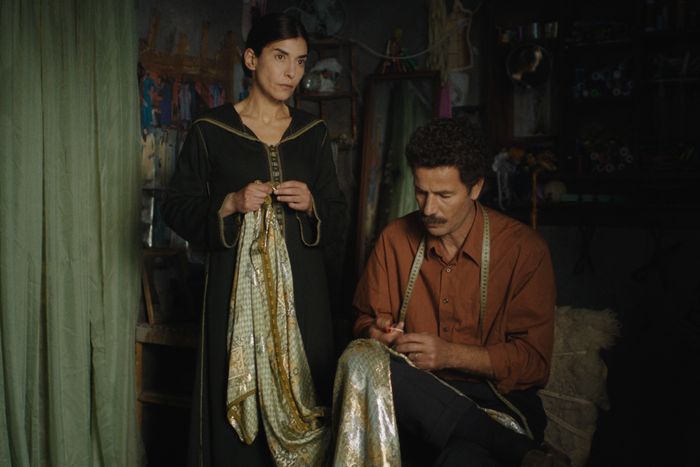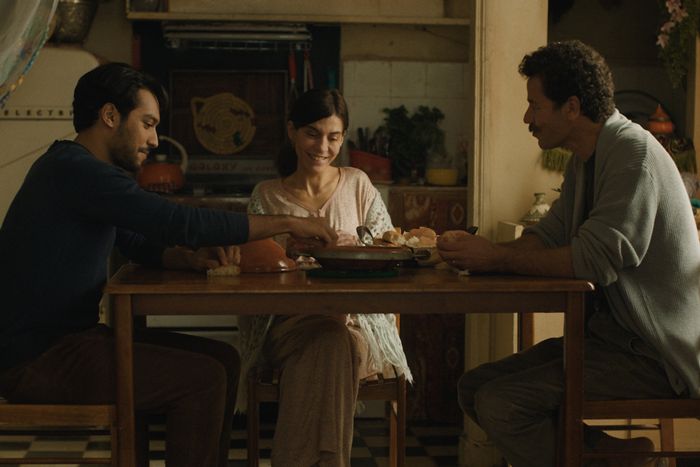
The adhan or azan, the Muslim call to prayer, is ubiquitous in The Blue Caftan. The five-times-a-day announcement is a somber, authoritative hum echoing in a caftan store run by married couple Halim (Saleh Bakri) and Mina (Lubna Azabal), in the side streets they frequent between work and their cozy apartment, and outside the hammam where Halim has brief weekly meetings with a series of anonymous male lovers. The presence of the adhan is as predictable as The Blue CaftanÔÇÖs plot, which follows Halim and MinaÔÇÖs relationship as it becomes complicated by a new apprentice in their store. But that familiarity doesnÔÇÖt make the adhan any less sonorous, or The Blue Caftan any less transportive. Maryam TouzaniÔÇÖs film is as precise and vivid as its titular garment.
Touzani has set both her films, 2019ÔÇÖs feature debut Adam and sophomore effort The Blue Caftan, in her home country Morocco, and within each explored emotional realities that interrupt religious or cultural prejudices. In Adam, Azabal played a widowed baker who takes in a pregnant, unmarried young woman. Like that film, The Blue Caftan, another collaboration between Touzani, writer Nabil Ayouch, and actress Azabal, walks a path that, while not unforeseeable, is still deeply felt.
The Blue Caftan probes the link between what you do and who you are, and points to the creeping carelessness of consumerism through clients who rarely value master caftan tailor HalimÔÇÖs singular talent. He and his business partner and wife MinaÔÇÖs staid routines get shaken up with the arrival of new employee Youssef (Ayoub Missioui). Tight close-ups collapse the space between Youssef and Halim as they sew together in the storeÔÇÖs backroom, and long takes capture their hands touching on a pair of scissors or on a spool of golden thread. Youssef soon draws MinaÔÇÖs passive-aggression after she notices Halim looking at him a little too long.
Can you tell where this is going? Of course. The film sometimes hits these beats a little too repetitively; HalimÔÇÖs wedding ring makes its way into several shots, and the blocking often suggests Mina is spying on Halim and Youssef. But Touzani trusts her actors enough to let their facial expressions and physicality say what these characters, guided by propriety and politeness, wonÔÇÖt. Azabal and Bakri are alternately warm and distant with each other, and that imbalance hints at what Mina guesses but forces herself to ignore. The performers are strengthened by how comfortable they are in discomfort, and how fluidly they move between affection and irritation. (Bakri is particularly good in a total-180 from his work in last yearÔÇÖs Costa Brava, Lebanon, all delicacy here in contrast to that filmÔÇÖs braggadocio.) And while Youssef is underwritten, Missioui hones in on the characterÔÇÖs pining need for approval, a quality that accentuates MinaÔÇÖs prickliness and HalimÔÇÖs self-suppression.
The Blue CaftanÔÇÖs plot sags a bit in its final third, once a revelation about Mina locks the film into a rigid eschaton. But Touzani also allows space to experiment and indulge in affective impact ÔÇö the dissimilar shades of green in a platter of half-rotted tangerines; the petrol-blue-satin caftan seemingly glowing in Halim and MinaÔÇÖs earth-tones apartment. The film gently, but unapologetically, pushes back against the conservatism that neither Halim, Mina, nor Youssef want to be defined by. ÔÇ£We can make something modern out of it,ÔÇØ Mina tells a prospective client when trying to sell a length of pink satin. TouzaniÔÇÖs film takes the sentiment to heart, transgressively personalizing Muslim ideology and boldly updating convention in its concluding scenes. When you have nothing left to lose, what are you brave enough to do? When others expect you to share their beliefs, what freedom does their narrow-mindedness provide? Tying grief and companionship together is a conventional way for The Blue Caftan to end, but the final shot is a quietly radical swerve. ItÔÇÖs fitting for a film that finds as much value in maintaining traditional practice, like the sonorous adhan, as it does in disrupting it. In those oppositional ideas, The Blue Caftan finds the right fit.
More Movie Reviews
- Flow Is an Animal Adventure ThatÔÇÖs Endearing and a Little Too Pretty
- Alien: Romulus Gets the Job Done, But at What Cost?
- Blitz Is the Worst Movie Steve McQueen Has Made



